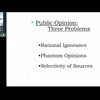deliberate
POSTPONED. NEW DATE PENDING. James Fishkin: Democracy When the People Are Thinking: Applications of Deliberative Democracy
Postponed. New date pending. James Fishkin, Professor of Communication, Professor of Political Science (by courtesy) and Director of the Center for Deliberative Democracy, Stanford University. Abstract D
James Fishkin: Is Deliberation an Antidote to Extreme Partisan Polarization? Reflections on “America in One Room”
AbstractIs Deliberation an Antidote to Extreme Partisan Polarization? Reflections on “America in One Room” Register here to join the seminar This talk is positioned at the intersectionof two literatures

James Fishkin: Is Deliberation an Antidote to Extreme Partisan Polarization?
James Fishkin: Is Deliberation an Antidote to Extreme Partisan Polarization? Reflections on “America in One Room” This talk is positioned at the intersectionof two literatures: partisan polarizatio
To seed or not to seed: Estimating the ethical value of directed panspermia
Acta Astronautica Abstract Directed panspermia involves the deliberate spread of life between planets by intelligent actors. While it was originally proposed to explain the origin of life on Earth, rece
Still heating: Unfolding a typology of climate obstruction
In N. Marschner, C. Richter, J. Patz, & A. Salheiser (Eds.), Contested climate justice – Challenged democracy: International perspectives (pp. 59-71). Campus Verlag GmbH Abstract Earth is on a catastryet, there is little sign of halting the rise of global greenhouse gas emissions orstopping the extraction of fossil fuels. Against this background, in this articlewe re-engage with a recently proposed typology supposed to cover three modesthrough which effective climate action has been obstructed. These are, first,primary obstruction, that is, the spread of disinformation and/or denying the veryexistence of anthropogenic climate change. Second, secondary obstruction concernsmore or less deliberate obstruction via opposition to climate action and policiesvia, for example, reference to “the threat of deindustrialisation”. Finally, tertiaryobstruction denotes modes of living which, while not necessarily obstructingeffective climate change intentionally, concerns “living in denial”. Drawing onrecent research and examples, we revisit this typology.
Stephen Gardiner: Generationally Parochial Geoengineering - A Threat to the Young and Other Future Generations
Place:At the Institute for Futures Studies, Holländargatan 13, Stockholm, or online. REGISTERAbstract'Geoengineering' has come to refer to massive, deliberate technological interventions into fundamentis Professor of Philosophy and Ben Rabinowitz Endowed Professor of the Human Dimensions of the Environment at the University of Washington, Seattle, where he is also Director of the Program on Ethics. His research focuses on global environmental problems, future generations and virtue ethics.Join the seminar online or at the Institute for Futures Studies. If you will join on site, please check the box in the
Breakfast seminar: Cultural heritage in war
The destruction of cultural property in war zones is of pressing concern. The recent and on-going conflicts in the Middle East have featured both the deliberate, symbolic destruction of cultural artef
Cultural heritage, law and war
The destruction of cultural property in war zones is of pressing concern. The recent and on-going conflicts in the Middle East have featured both the deliberate, symbolic destruction of cultural artefThis seminar brings together speakers from philosophy, archaeology, political science and international law. Topics to be discussed include the protection of heritage as a just cause for war, identity wars, military policy and heritage, the relationship between heritage and violence, and compensatory duties for damaged cultural sites.
Chapter 26: The evolution of legal positivism: Reflections on continuity and discontinuity in the positivist tradition
In Zaluski, W., Bourgeois-Gironde, S. & A. Dyrda (eds.) Research Handbook on Legal Evolution. Elgar Abstract This chapter maps the evolution of legal positivism (LP) with an eye to both continuous and

Karin Bäckstrand
I am a Professor in Environmental Social Science at the Department of Political Science at Stockholm University. My research revolves around global environmental politics, non-state actors in climate








